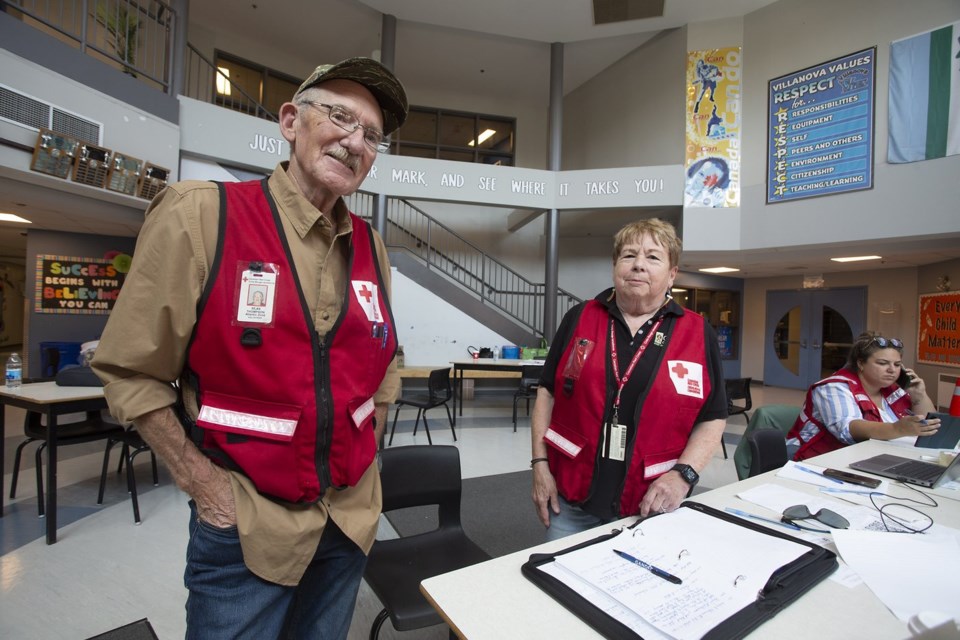ST. JOHN'S — Scott Chandler's home burned in a Newfoundland wildfire this week — but he finds assisting others fleeing the flames keeps him hopeful amid the loss.
The 45-year-old lieutenant in the Canadian Forces said in an interview he, his wife Robyn Dwyer, and their eight-year-old son had to depart Broad Cove on Monday, leaving the home they acquired three years ago along the shores of western Conception Bay.
They've joined a stream of hundreds of other evacuees ordered to leave the small communities, with about 900 people from two towns added to the list on Thursday afternoon.
Chandler says he watched Wednesday on his home surveillance camera video as flames damaged his home. By then, the family was safe, staying with relatives in Carbonear.
Now the couple passes the days — from dawn to dark — helping with a variety of jobs at an evacuation centre set up at the Carbonear Academy.
"It's therapeutic for us. We like giving back ... this isn't our first evacuation and we have knowledge from those experiences, and people appreciate that," he said, noting his family went through several evacuations due to Alberta wildfires.
The military officer said there were about 75 to 100 people receiving meals and 15 to 20 are sleeping at the centre. With word Thursday that people were ordered to leave Salmon Cove and Ochre Pit Cove, hundreds more will arrive to register, rest and have a meal.
Premier John Hogan said Thursday the worst of three out-of-control blazes — a 21-square-kilometre fire near Kingston and the amalgamated community of Small Point–Adam’s Cove–Blackhead–Broad Cove — was continuing to spread.
A smaller fire near Holyrood also forced evacuations, and in central Newfoundland, the province ordered people to leave cabins in the Martin's Lake area as a two-square-kilometre fire kept burning out of control at its southern edge.
Hogan announced Thursday the federal government has approved support and personnel from the Canadian Forces and the coast guard, which could bring Canadian Forces firefighters, coast guard helicopters, and soldiers to transport food and medical supplies.
"The forecast for next week is for increased winds, so it's important to do all we can to suppress the flames before the wind picks up next week," said the premier, who said there was no estimate yet on how many structures have burned.
Duane Antle, president of the Newfoundland and Labrador Association for Fire Services, said the situation is unprecedented in his lengthy career as a firefighter.
The 56-year-old said in an interview Thursday that frequency of fires has been increasing in the province, estimating that this year there have been just under 200 fires logged by his association, compared to 60 last year.
"I've never seen anything, you know, to this magnitude that I can remember ... Over the last couple of years, these things have been getting worse and worse," he said.
Volunteer firefighters face exhaustion, a loss of income and personal risk. "It's very hard work, and very dangerous work," he said. "You're watching people lose their homes. You're watching people lose things that they work hard for."
Chandler said he's observed his own son's grief at losing his books, a favourite toy and the place he sleeps.
"As my son was leaving an evacuation centre, a member of the community asked him how he was feeling. And he said, 'I don't have a bed to sleep in.' No eight-year-old should have to say that," he said.
Chandler said he wants to keep busy, in part to keep his thoughts off the hard tasks ahead. "Honestly, if I stay occupied, my mind doesn't go there. ... I want my community to know that we're OK, we'll get through this, we're strong and we can rebuild," he said.
"We draw strength off each other."
John Haggie, minister of justice and public safety, said Thursday about 80 per cent of evacuees find their own accommodations, and the Red Cross helps the remaining people find places to stay.
However, he also noted that hotels and other accommodations are in short supply throughout the Avalon Peninsula, and he was grateful that some bed and breakfasts were starting to offer beds for the evacuees.
Environment Canada is forecasting highs of 28 C on Friday, with only a few clouds, and "local smoke" for the areas around St. John's.
This report by The Canadian Press was first published Aug. 7, 2025.
— Story by Michael Tutton in Halifax.
The Canadian Press




